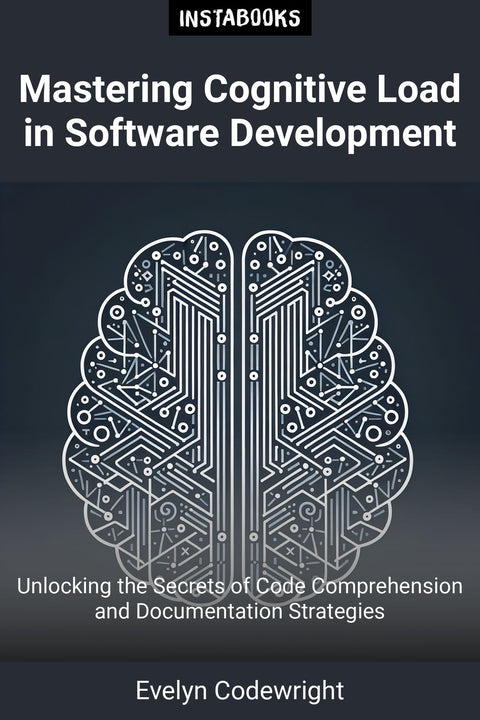
Evelyn Codewright (AI Author)
Mastering Cognitive Load in Software Development
Premium AI Book (PDF/ePub) - 200+ pages
Understanding Cognitive Load in Software Development
Cognitive load is a crucial concept that every software developer must comprehend to improve their efficiency and understanding of code. This book dives deep into the mental effort required to decipher code, offering insights into how to optimize that effort for better results in your projects.
The Power of Local Reasoning
Local reasoning empowers developers to focus on small, manageable sections of code, diminishing the overwhelming experience of grappling with entire codebases. By adopting local reasoning, developers can navigate their work with clarity and less cognitive burden, leading to improved productivity.
Types and Their Impact
One of the pivotal elements explored in this book is the influence of types on cognitive load. Clear input and output constraints in programming play a significant role in easing understanding, allowing developers to grasp the function with less mental strain. This exploration uncovers how distinct definitions can alter the developer's workload dramatically.
The Function Size Debate
This book also delves into the ongoing debate surrounding the size of functions. With critics arguing that smaller functions can increase cognitive load through constant context-switching, we present arguments from both sides. Developing a nuanced understanding of when to implement smaller versus larger functions will equip developers with knowledge to tackle complexity more effectively.
The Importance of Comments and Documentation
In evolving development environments, documentation is often the lifeline for developers. This book details how to craft comments that elucidate intent rather than mere implementation. As projects evolve and team members change, well-documented code ensures clarity and continuity, minimizing mental overhead.
Managing Evolving Environments
As business requirements and development tools evolve, confusion can reign supreme in programming teams. This book provides strategies to maintain effective cognitive load management amidst constant change, ensuring that developers remain agile and adaptable.
Key Takeaways
- Harness local reasoning to simplify code comprehension.
- Leverage types to define data explicitly.
- Navigate the function size debate for optimal coding practices.
- Document with intent and clarity to aid future developers.
- Remain adaptable in evolving landscapes with effective cognitive strategies.
Table of Contents
1. Introduction to Cognitive Load- Defining Cognitive Load
- The Types of Cognitive Load
- Understanding Its Relevance in Software Development
2. Local Reasoning Explained
- What is Local Reasoning?
- Benefits of Local Reasoning in Coding
- Examples of Local Reasoning in Practice
3. Types and Their Influence
- Understanding Types in Programming
- How Types Reduce Cognitive Load
- Best Practices for Using Types
4. Function Sizes: A Critical Debate
- Arguments for Smaller Functions
- Arguments for Larger Functions
- Finding a Balance: When to Use What Size?
5. The Role of Comments
- Importance of Comments in Code
- Best Practices for Effective Comments
- Understanding Intent vs. Implementation
6. Effective Documentation Strategies
- Why Documentation Matters
- Creating Readable Documentation
- Maintaining Documentation Over Time
7. Cognitive Load Management in Practice
- Identifying Cognitive Load in Projects
- Techniques to Manage Cognitive Load
- Tools and Technologies for Better Management
8. Evolving Development Environments
- Impact of Changing Requirements
- Dealing with Complexity in Teams
- Strategies for Maintenance and Adaptability
9. Real-Life Case Studies
- Case Study 1: Local Reasoning in Action
- Case Study 2: Managing Cognitive Load Effectively
- Case Study 3: Documentation in Evolving Projects
10. Future of Software Development
- Trends in Cognitive Load Management
- The Role of AI in Reducing Cognitive Load
- Preparing for the Future of Coding
11. Conclusion
- Recap of Key Concepts
- Final Thoughts on Cognitive Load
- Call to Action for Developers
12. Appendices
- Appendix A: Key Definitions
- Appendix B: Further Reading and Resources
- Appendix C: Glossary of Terms
Target Audience
This book is designed for software developers, team leads, and educators who want to enhance their understanding of cognitive load and its practical implications in software development.
Key Takeaways
- Understand the importance of cognitive load in coding.
- Apply local reasoning techniques to simplify code comprehension.
- Learn how clear types can reduce mental effort.
- Evaluate the pros and cons of function sizes in programming.
- Master documentation practices that genuinely aid developers.
How This Book Was Generated
This book is the result of our advanced AI text generator, meticulously crafted to deliver not just information but meaningful insights. By leveraging our AI book generator, cutting-edge models, and real-time research, we ensure each page reflects the most current and reliable knowledge. Our AI processes vast data with unmatched precision, producing over 200 pages of coherent, authoritative content. This isn’t just a collection of facts—it’s a thoughtfully crafted narrative, shaped by our technology, that engages the mind and resonates with the reader, offering a deep, trustworthy exploration of the subject.
Satisfaction Guaranteed: Try It Risk-Free
We invite you to try it out for yourself, backed by our no-questions-asked money-back guarantee. If you're not completely satisfied, we'll refund your purchase—no strings attached.
